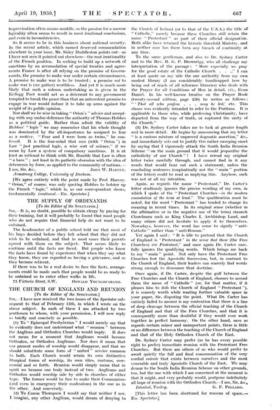THE CHURCH OF ENGLAND AND REUNION [To the Editor of
the SPECTATOR.] Sin,—I have now received the two issues of the Spectator sub- sequent to that of February 15th, in which I wrote on the above subject. In each of these I am attacked by two gentlemen to whom, with your permission, I will now reply as briefly and concisely as possible.
(I) To "Episcopal Presbyterian" I would merely say that he evidently does not imderstand what " reunion " between the Anglican and Orthodox Churches would imply. It does not mean for a moment that Anglicans would become Orthodox, or Orthodox Anglicans. Nor does it mean that our present modes of worship would disappear, and that we should substitute some form of " united " service common to both. Each Church would retain its own distinctive liturgical forms of worship, its own rites, customs, cere- monial and so forth. Reunion would simply mean that in spirit we became one body instead of two. Anglicans and Orthodox would worship side by side in churches of either type. The former would be free to make their Communions (and even in emergency their confessions) in the one as in the other:. And conversely:
. (2) To :Canon Thompson I would say that neither I -nor, I imagine, any other Anglican; would dream of denying to
the Church of Ireland (or to that of the U.S.A.) the title of "Catholic," merely because these Churches still retain the name " Protestant " as part of their official designation. Both alike have retained the historic threefold Ministry, and in neither case has there been any breach of continuity at any time.
To the same gentleman, and also to Dr. Sydney Carter and to the Rev. R. G. P. Brownriacr, who all challenge my interpretation of the passage : More especially we pray for the good estate of the Catholic Church . . .," I can at least quote on my side the one authority from my own modest library (I am considerably handicapped here by being out of reach of all reference libraries) who deals with the Prayer for all Conditions of Men in detail, viz., Evan Daniel. In his well-known treatise on the Prayer Book
(twenty-second edition, page 220) he writes as follows : " ' That all who profess . . . may be led,' etc. This
clause was evidently intended to refer to the Puritans. It is applicable to those who, while professing Christianity, have departed from the way of truth, or ruptured the unity of the Church."
(3) Dr. Sydney Carter takes me to task at greater length and in more detail. He begins by announcing that my letter "is a curious mixture of unproved dogmatic assertion," &c., and immediately sets out to justify this rather sweeping onset by saying that I vigorously attack the South India Reunion Scheme "on the main ground that it would jeopardize the catholicity of our Church " ! I have reread my original letter twice carefully through, and cannot find in it any words that would bear out such a statement, unless the concluding sentences (emphatically not the " main " portion of the letter) could be read as implying this. Anyhow, such was not at all my intention.
Again, as regards the name "Protestant," Dr. Carter's letter studiously ignores the precise wording of my own, in
which I spoke of the "Protestant Churches—in the modern connotation of the term at least." The qualification must be noted, for the word " Protestant " has tended to change its
meaning in recent times. In its original sense (whether in the affirmative or in the negative use of the term) staunch Churchmen such as King Charles I, Archbishop Laud, and many others did not hesitate to apply it to themselves. Nowadays, however, the word has come to signify " anti- Catholic " rather than "anti-Roman."
. Yet again I said : "It is idle to pretend that the Church of England is ' Protestant ' in the sense that these (the Free Churches) are Protestant," and once again Dr. Carter care- fully ignores the qualifying words. Which brings me back to my " main " point. Not only have the Protestant Free Churches lost the Apostolic Succession, but, in contrast to the Church of England, their leaders can scarcely find words strong enough to denounce that doctrine.
Once again, if Dr. Carter, despite the gulf between the Free Churches and the Church of England, chooses to accord them the name of " Catholic " (or, for that matter, if it
pleases him to dub the Church of England "Protestant "); it is scarcely worth while wasting further valuable space la
your paper, Sir, disputing the point. What Dr. Carter has entirely failed to answer is my contention that there is a line of deep cleavage between the official teaching of the Church of England and that of the Free Churches, and that it is consequently more than doubtful if they would ever work together in perfect harmony. On the other hand, save as regards certain minor and unimportant points, there is little or no difference between the teaching of the Church of England and that of the Holy Orthodox Church of the East.
Dr. Sydney - Carter may prefer (as he has every possible right to prefer) immediate reunion with the Protestant Free Churches. But there are others of us who would prefer to
await quietly the full and final consummation of the very cordial entente that exists between ourselves and the most venerable and truly Apostolic Church of the East. We may
demur to the South India Reunion Scheme on other grounds, too, but the one with which I am concerned at the moment is
that it might, and very probably would, postpone indefinitely all hope of reunion with the Orthodox Church.—I am, Sir, &c., [This letter has been shortened for reasons of space. ED. Spectator.]










































 Previous page
Previous page